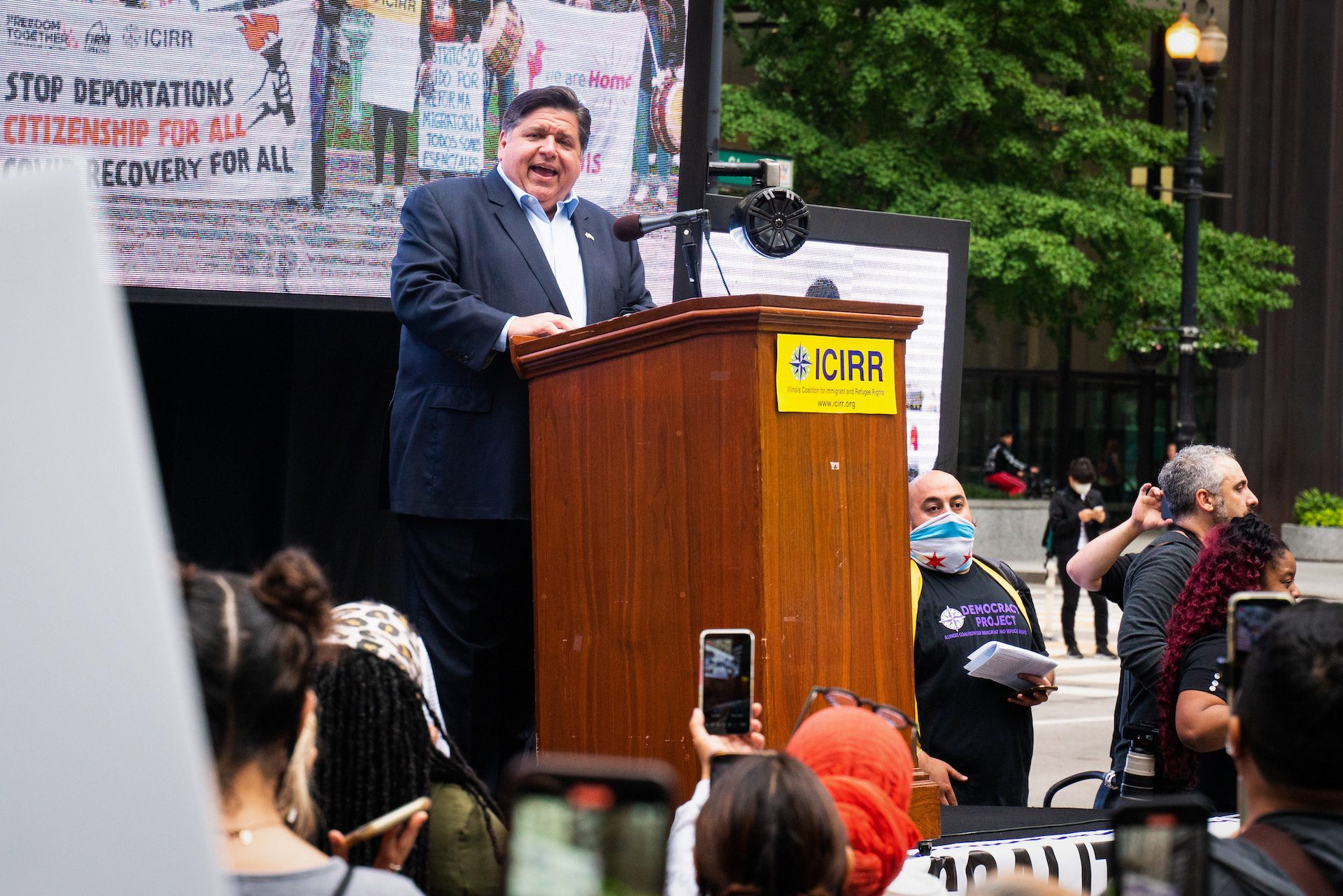 Camilla Forte/Borderless Magazine
Camilla Forte/Borderless MagazineEarlier this year, Gov. J.B. Pritzker unveiled his proposed $55.2 billion budget for 2026. The plan would eliminate funding for the Health Benefits for Immigrant Adults program, which provides healthcare to undocumented immigrants between the ages of 42 and 64.
Illinois Gov. J.B. Pritzker has been a staunch advocate for immigrant communities, but his latest state budget proposes eliminating critical resources.
Last month, Pritzker unveiled his $55.2 billion budget for 2026. The proposed budget looks to eliminate healthcare funding for some immigrants. The Health Benefits for Immigrant Adults program provides healthcare to immigrants who lack status between the ages of 42 and 64. The new budget, if approved, will be implemented on July 1, the start of the state’s new fiscal year.
The plan to eliminate the program comes as President Donald Trump has begun initiating his attacks on immigrants. The new president has carried out widespread deportation actions, attempted to overturn birthright citizenship and sued Chicago, Cook County and Illinois for its sanctuary city policies.
News that puts power under the spotlight and communities at the center.
Sign up for our free newsletter and get updates twice a week.
Pritzker, a staunch critic of Trump, promised during his State of the State address that he would deliver a balanced budget, but made clear that Illinoisians would face challenges at the hands of the new presidential administration.
“But if there’s one thing I’ve learned as governor – there are no magic bean fixes. And each year, there’s some difficulty that requires us to work hard to overcome it,” he said. “This year, the surfacing difficulty is Donald Trump’s and Elon Musk’s plan to steal Illinois’ tax dollars and deny our citizens the services that they need.”
Gov. Pritzker warned Trump’s proposed tariffs and cuts to federal spending could potentially impact the economy. Still, Pritzker received heavy criticism from fellow Illinois Democrats because of his plan to eliminate the program that provides health insurance for more than 30,000 people who don’t qualify for Medicaid.
Borderless compiled a guide to help people understand the new Illinois budget and who will be impacted by this funding loss.
What is the Health Benefits for Immigrant Adults program?
The HBIA program provides healthcare to immigrants between the ages of 42 and 64 who lack legal status. Health benefits include primary care visits, care at a Federally Qualified Health Center, prescription drugs, dental and vision services and transportation services.
To qualify, individuals must be at least 42 years old and under 65, be an undocumented immigrant or have Temporary Protected Status. They must also have an annual 2022 household income at or below $18,754 for one person and at or below $25,268 combined income for a household size of two.
Read More of Our Coverage
Illinois also provides medical coverage to individuals aged 65 or older through the Health Benefits for Immigrant Seniors program. Individuals receive the same benefits as the HBIA program as long as they are 65 years or older, an Illinois resident, an undocumented immigrant, and have an annual 2022 income at or below $13,590, or a couple with an annual income at or below $18,310, and assets below $17,500.
Pritzker’s move to eliminate the program would save the state around $330 million in state funding. The budget, if approved, is meant to go into effect July 1.
Who will be affected by the loss of funding?
As of December, HBIA covered around 33,000 people who don’t qualify for traditional Medicaid. Almost 69,000 people are covered by both the HBIA and HBIS programs.
How are elected officials and advocacy groups responding?
After a heated speech where Pritzker likened Trump and his administration to Nazism in 1930s Germany, many organizations and fellow Democrats critiqued him for his proposal to pull funding from the HBIA program.
“We believe that health care is a human right, and we believe that taking people off of health care is not the right answer,” said Illinois Sen. Karina Villa, who represents West Chicago.
Urbana Rep. Carol Ammons said she was a “no” vote on the budget as it was presented. “And until we get to a ‘yes,’ that means my community needs to tell me that they are receiving resources that were promised to them.”
Members of the Illinois Legislative Black Caucus and Illinois Legislative Latino Caucus, which comprise around a quarter of all lawmakers in the General Assembly, opposed Pritzker’s proposed budget, expressing disappointment for neglecting these communities’ experiences.
“All of us have been hearing that it was going to be a tough budget year. I think that we expected there to be some things in the budget that we weren’t going to be happy with,” Villa said. “But I think completely removing a program is not anything that we were expecting.”
Following Pritzker’s address, The Illinois Coalition for Immigrant and Refugee Rights also condemned Pritzker’s decision and called for the administration to put additional revenue towards ensuring undocumented communities receive sufficient resources.
“The budget proposal also includes a major step backward by eliminating funding for healthcare for immigrant adults with no other options,” ICIRR said in a statement. “At a moment when the federal government is threatening healthcare cuts and leveling repeated attacks against immigrants, our state cannot scale back. Illinois has been a national leader in holding the line against Trump, and our Illinois elected officials must continue to set that tone.”
“ICIRR stands by the recommendations put forth by the Illinois Revenue Alliance that identified $6 billion in potential revenue that the state leaves uncollected year after year. Collecting revenue through these sources will ensure that the programs our communities need are sustainably funded without putting additional burden on working families through regressive options or program cuts.”
What’s Next?
Officials are expected to vote on the budget at the end of May.
Tara Mobasher is a Northwestern Medill Reporting fellow at Borderless Magazine. Email Tara at [email protected].
Correction 4/14/25: An earlier version of this article incorrectly stated the proposed amount of money being cut in Gov. J.B. Pritzker’s budget.


